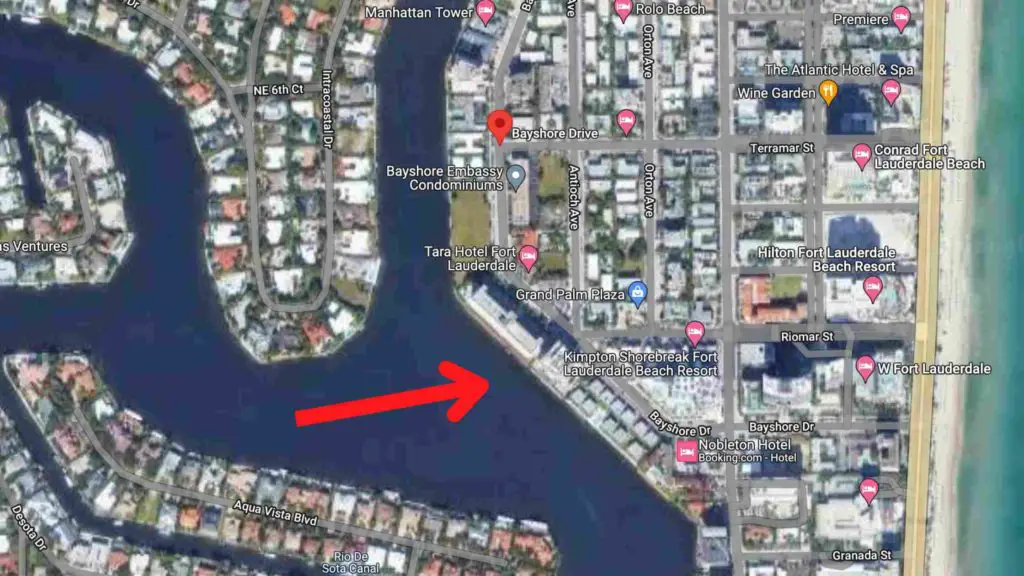Fort Lauderdale is one of the most beautiful cities in Florida. Near Miami, Lauderdale receives thousands of tourists every year because of its amazing beaches and the city’s attractions. However, as Florida is considered the “shark bite capital of the world,” some people may wonder about sharks in the area. So it brings the question: are there sharks in Fort Lauderdale?
At least 45 species of shark have been recorded in Fort Lauderdale. Yet, despite the high levels of shark activity in the paradisiacal beaches of the “Venice of America,” attacks are rare in the city. Since 1964, only 14 shark incidents have been registered in Fort Lauderdale, with no fatal victims.
In this article, I’ve prepared a list of the 15 most common shark species in Fort Lauderdale and a database with all the shark attacks registered in the area. Also, you’ll find two unique stories of sharks in the area, including a Bull Shark attack off the ocean (in an estuary) and the two fishermen who caught a Great White Shark in Fort Lauderdale. A lot of fun facts and great information!
Keep reading to learn about the most common sharks in Fort Lauderdale.
Are There Sharks In Fort Lauderdale? (Species Guide)

Florida is home to several species of sharks, and it is (by far) the place in the world with the highest number of shark bites. However, most incidents have occurred in Volusia County and Brevard County. In Fort Lauderdale, shark presence is widespread, but shark attacks are rare. In total, at least 45 species of shark can be found in these Floridian waters, and 15 are common to the area.
The 15 most common shark species in Fort Lauderdale are:
- Nurse Shark
- Blacktip Shark
- Tiger Shark
- Great Hammerhead Shark
- Bull Shark
- Caribbean Reef Shark
- Lemon Shark
- Sandbar Shark
- Silky Shark
- Dusky Shark
- Scalloped Hammerhead Shark
- Smooth Hammerhead Shark
- Whale Shark
- Bonnethead Shark
- Smalltooth Sawfish (Ray, not a shark)
Despite the presence of some dangerous species, such as the Bull Shark and the Tiger Shark (2 of the three involved in most attacks on humans), shark incidents are sporadic in Fort Lauderdale. Since databases and institutes started collecting data, only 14 episodes were recorded in the city, with no casualties (in the final section of this article, you can find a complete description of the 14 incidents with sharks that took place in the area).
- Shark Species In Fort Lauderdale: 45 (At Least)
- Most Frequently Seen: Nurse Sharks
- Most Dangerous/Aggressive Species: Bull Sharks / Tiger Shark / Great White Shark
- Biggest Sharks Found In Fort Lauderdale: Whale Shark (largest species on Earth)
Other beautiful specimens found in Fort Lauderdale (but not limited to) are the Shortfin Mako Sharks, Porbeagles, Blue Sharks, the ferocious Oceanic Whitetip Shark, and the feared and famous Great White Shark.
Related Article: Are There Sharks In Daytona Beach? (Sharks Guide)
Drone Footage: Sharks Near People In Fort Lauderdale
The following video shows sharks moving close to swimmers in Fort Lauderdale. In this incredible footage, two sharks can be seen swimming not far from the shore, with several people swimming in the surf, unaware of these gigantic creatures swimming nearby.
Despite shocking for some people, this video only confirms that shark attacks are rare, even in Florida. Florida is the world’s shark bite capital, with the most bites per year. However, even in the Sunshine State, the chances of dying attacked by a shark are very low (1 in 4,332,817). For example, only 14 incidents were registered in Fort Lauderdale, with no fatal victims.
Great White Shark Caught In Fort Lauderdale
The White Shark, commonly referred to as the Great White Shark, is probably the most famous (and feared) shark species on Earth. These fantastic beasts can be found in coastal waters up to 75 degrees worldwide and are frequent visitors in Florida. Therefore, despite not being typical to see, there are records of some of them cruising around Fort Lauderdale.
These large predatory fish can grow up to 20 ft and weigh up to 2000 pounds. White Sharks feed on fish, rays, other sharks, harbor seals, sea lions, elephant seals, small-toothed whales, sea turtles, and sea otters and scavenge on large animal carcasses. This is one of the top-3 most dangerous species, involved in many attacks on humans. The other two are the Bull Shark and the Tiger Shark.

However, most attacks happen accidentally, and even unexpected encounters can become a great story. That’s the case for two fishermen from Fort Lauderdale, David Greco, and Dominic Miller, who went out fishing for a day and reeled in a gigantic White Shark. So the two men started the day of fishing as usual. Throwing some lines and hooking up a few small fish and trading them up to try, in David’s words, “some bigger bites.” And well, they got it.
They hooked a ferocious gigantic Great White Shark, about 16 feet in size and weighing way over 1000 pounds. In a range of emotions, the two friends fought with the animal for about an hour and a half. After the animal was close enough to the boat, they took a few pictures and returned the beast to its home in the ocean.
They describe the experience as “cool” and “mind-blowing” and say that the animal was calm and healthy when they released him to swim away to the water. What a catch! You can check this incredible story’s details in the following video.
Related Article: Are There Sharks In Delaware River? (Surprising Answer)
Bull Shark Attack In Fort Lauderdale
In Fort Lauderdale, very few people can tell they were bitten and slapped in the face by a Bull Shark and survived to tell the story. But Jessica Vaughn, 22 years old at the time of the attack, faced the monster and lived to describe such a crazy story.
The Sunday afternoon of June 1, 2014, started as a typical weekend day for Jessica and some friends. They were tubing in the Intracoastal Waterway, a channel (estuary) located in Fort Lauderdale. She had been on a boat with Peter Hogge and three other friends near Bayshore Towers condominiums, just south of Sunrise Boulevard.

Fun Fact: Bull Sharks Can Adapt Well To Salt And Freshwater!
Bull Sharks are dangerous but also one of the most incredible species of shark on Earth. They have developed the remarkable ability to live in salt and fresh water. And it’s not just that they were found a few meters from the sea or in river mouths. Bull Sharks have already been recorded in rivers thousands of miles from the sea. So it’s not strange that one of them was in an estuary.
Back to the story, Jessicas’s friends put on life vests and jumped into the water to go inner-tubing. When it was her turn, she jumped into the water and started swimming toward the tube, but a Bull Shark got in her way. The animal came from behind her and grabbed her leg. Fortunately, instead of keep attacking, the shark just turned and, believe it or not, slapped her face with its fin.
After that, her friends immediately pulled her back on the boat and took her to the shore at Bayshore Drive before calling 911. Unfortunately, Jessica suffered severe lacerations to the right lower leg. Still, she was taken to the hospital by the Fort Lauderdale Fire Rescue, where she underwent a two-hour surgical repair. One of the friends, Peter Hogge, saw the shark and identified it as Bull Shark, about four feet in length. For more details (and actual pictures of Jessica), read the full story at ABC News.
Related Article: Are There Sharks In Bar Harbor Maine? (Full Guide)
Shark Attacks In Fort Lauderdale
Finding reliable data on Internet can be challenging. Still, when it comes to shark incidents, there are at least two great and reliable institutes that keep track of this kind of information, the International Shark Attack File (ISAF) and the Global Shark Attack File (GSAF).
After extensive research in their files, I found 14 incidents in the region of Fort Lauderdale, with the first report dating back to 1964. Fortunately, there is no official register of fatal attacks in the area. The shark species involved in most incidents are the Nurse Shark, followed by the Bull Shark and the Hammerhead Shark.
The final numbers are described in the following list, and all the attacks are detailed with dates and incident types in a table at the end of this section.
- Total Incidents Reported: 14
- Provoked Attacks: 2
- Unprovoked Attacks: 10
- Invalid Data: 2 (Shark involvement not confirmed)
- Fatal Attacks: 0
| Date | Area | Location | Activity | Incident Type | Fatal? |
| 25-Mar-2021 | Florida | Fort Lauderdale | Swimming | Unprovoked | No |
| 21-Aug-2019 | Florida | Fort Lauderdale | Wading | Unprovoked | No |
| 05-Jun-2015 | Florida | Fort Lauderdale | Shark rescue attempt | Unprovoked | No |
| 01-Jun-2014 | Florida | Fort Lauderdale | Swimming | Unprovoked | No |
| 11-Jul-2010 | Florida | Lauderdale-by-the-Sea | Fishing | Provoked | No |
| 13-Sep-2007 | Florida | Lauderdale-by-the-Sea | Snorkeling | Unprovoked | No |
| 03-Sep-2007 | Florida | Fort Lauderdale | Swimming | Unprovoked | No |
| 13-Feb-2005 | Florida | Fort Lauderdale | Spearfishing | Unprovoked | No |
| Jul-2003 | Florida | Fort Lauderdale | Spearfishing | Unprovoked | No |
| 01-Apr-2002 | Florida | Lauderdale-By-The-Sea | Swimming | Unprovoked | No |
| 25-Dec-1997 | Florida | Fort Lauderdale | – | Invalid | No |
| 29-Apr-1968 | Florida | Fort Lauderdale | Wading | Invalid | No |
| 11-Jun-1966 | Florida | Fort Lauderdale | Fishing | Provoked | No |
| 05-Mar-1964 | Florida | Fort Lauderdale | Free Diving | Unprovoked | No |
Related Questions
Are there any sharks in Fort Lauderdale? There are 45 species of sharks in Fort Lauderdale, and 15 of them are very common in the area. However, despite Florida being the world’s number one place in the number of shark attacks, incidents in Fort Lauderdale are rare, with only 14 reports since 1964.
Where can I see sharks in Fort Lauderdale? Sharks are all over Fort Lauderdale, and at least 45 species have been recorded in the area. However, the best place to see one of these beautiful animals is by visiting an aquarium in the region or diving with professionals to see sharks in their natural habitat.
Do sharks come out at night in Florida? As a general rule, sharks are more active at dawn and dusk. According to ISAF, most shark attacks in Florida occur between 11 AM and 7 PM. However, it doesn’t mean that sharks are less active at night, but that there are fewer people in the ocean at night.
Sources
- Shark Attack Data: http://www.sharkattackdata.com/place/united_states_of_america/florida
- Global Shark Attack File (GSAF): https://www.sharkattackfile.net/
- Florida Museum: https://www.floridamuseum.ufl.edu/
- International Shark Attack File (ISAF): https://www.floridamuseum.ufl.edu/shark-attacks/
- Sea Grant Florida: Common sharks of Florida
- Shark Tours: Shark species of Florida
- Outforia: Sharks in Florida
- Florida GoFishing: Shark species | Shark ID Guide
